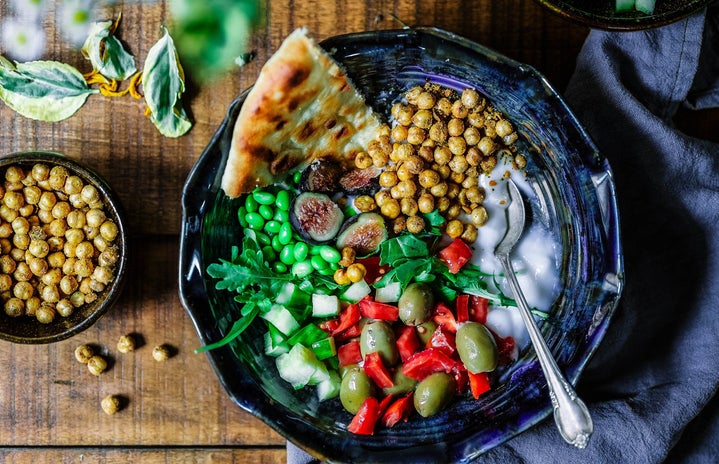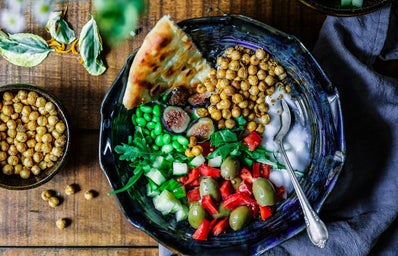If you’re a UMass student, you may be familiar with the class My Body My Health. Through a 30 day duration of this class, I was challenged with the Health Behavior Change Project, or HBCP. For my HBCP, I chose to transition my eating habits to follow the Mediterranean diet.

The Mediterranean diet spoke to me because I wouldn’t have to cut out any major food groups such as meat or dairy (I don’t want to live a life that doesn’t involve steak and cheese), but instead, focuses on minimizing certain food groups such as red meat, excess dairy, processed or refined grains, and foods with artificial or added sugars. The diet revolves around healthy fats such as olive oil, avocados, and nuts, and lots of fresh produce, protein such as chickpeas or split peas, some poultry, dairy such as soft cheese and greek yogurt, and lots of whole grains such as quinoa or sprouted bread. Hormone free and organic foods are also recommended. For liquid intake, water, tea, and black(ish) coffee, or a healthy power-packed smoothie are central to this diet. Excluding juice and soda is super important.

Going into this diet, I was fearful that I wasn’t going to get enough protein and that I wouldn’t be able to afford it. The thought of buying fresh produce, fish, and healthy organic snacks or bread every week was already making my pockets hurt. And in addition to that, the cheaper meats I would be eating, like chicken, were to be hormone free or organic, which added at least a few more bucks onto the price per pound. Since this was my first year living alone and I had to do all my own shopping on a super strict budget, I had to find a way to make it work.
I realized that buying frozen fruits and vegetables saved a ton of money, and that canned protein-rich beans such as chickpeas were super affordable and also saved me time when preparing food. I could still get my protein and produce intake while saving money and convenience. I also did more shopping at stores such as Aldi, or I went to different grocery stores to buy certain things if I knew they were cheaper at that location. All in all, it wasn’t super difficult to stay on budget and get all of my nutrients in.
Physically, this diet made me feel more energized and more powerful. Eating less processed foods (meat, carbs, etc.), increasing produce, and drinking a ton of water boosted my energy and mood while making my body feel less sluggish and my mind less clouded. My workouts benefited from this increase in energy and power, which made me feel even better. My skin started to glow differently, and I overall just felt better about myself because I knew I was nourishing my body.
Although the challenge was only for 30 days, I still implement all of the rules of this diet as best as I can into my daily food intake because it’s really surprisingly easy to do. I liked that I didn’t have to cut out any major food groups, so I didn’t beat myself up if I ate an unhealthy meal. All in all, I will continue to try to eat based off of this diet because with it I feel like the best version of me.




